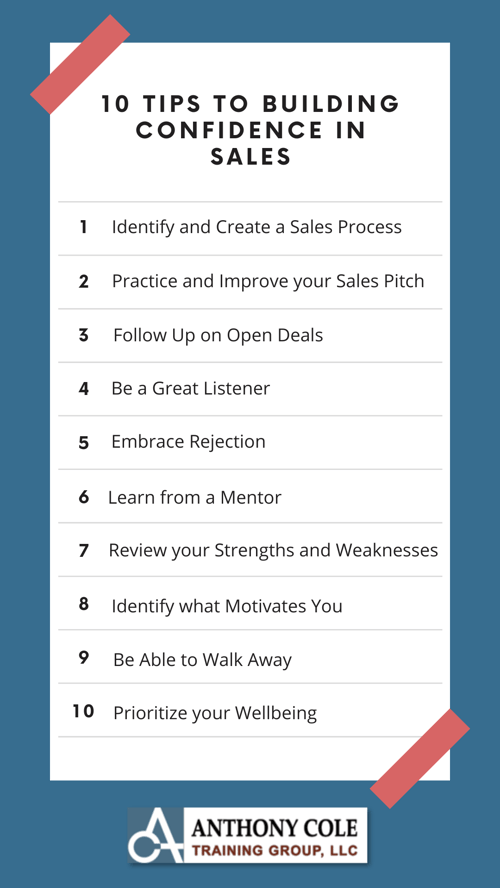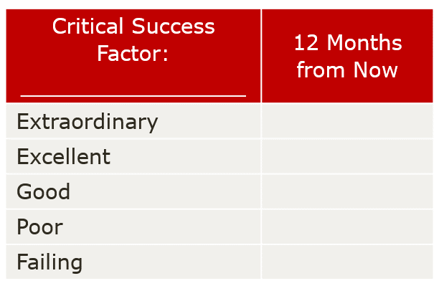Selling is a “slight edge business.” By that, we mean that the line that separates high performers from mediocre performers is usually a very small difference.
There is very little you can control in selling. You can’t make prospects take your call. You can’t make prospects agree to meet with you. You can’t make them move forward in your sales process and you certainly can’t make them buy from you. However, there is a multitude of things you are in control of and mastery of these 10 tips will give you greater confidence in sales.
How to Build Confidence in Sales
- Identify and Create a Sales Process
- Practice and Improve your Sales Pitch
- Follow Up on Open Deals
- Be a Great Listener
- Embrace Rejection
- Learn from a Mentor
- Review your Strengths and Weaknesses
- Identify what Motivates You
- Be Able to Walk Away
- Prioritize your Wellbeing
- Identify and Create a Sales Process
First and foremost, you’ll need a repeatable sales process that you and your sales team can implement. Based in the #1 sales evaluation, “elite” salespeople utilize a consistent, stage-based selling system. Having a sales process keeps salespeople on track on the stages a buyer goes through on the path to a decision and will help to remove any inefficiencies from the sales cycle. Just by implementing a great sales process alone, salespeople can see better results in a short period of time.
- Practice and Improve your Sales Pitch
Much like your sales process, sales reps need to hone, craft, and practice their perfect sales pitch. You can start creating a better sales pitch by doing more research on your prospects, always put yourself in their shoes and ask through their lens “what’s in it for me?”. As a salesperson, you must invoke confidence. You can do this by practicing and perfecting your sales pitch. We call this your Unique Selling Approach and when you share it, your prospect should react with “That’s me” or “How do you do that?” Practice this so that your USA is natural and conversational to build your confidence in selling.
- Follow Up on Open Deals
A good sales rep follows up on open deals. It’s great to get the word out, but as a salesperson, you will have more success following up on your existing prospects. It’s estimated that nearly half of salespeople never follow up on a prospect, and only 10% follow up three times or more. In fact, it’s estimated that 80% of all closed deals occur between the 5th and 12th outreach.
Following up also shows the prospect that you’re organized and considerate to reach out again. Most people will appreciate your follow up, and just by reminding them of your previous conversation, you can be more top-of-mind amongst your prospects, and build credibility.
- Be a Great Listener
Having an open dialogue is critical in nurturing your prospects and giving them a voice. Make sure you’re really listening to what they’re saying as it can help you close more deals. By listening to better understand your prospects, you can better identify what your prospect wants, how they want it, and why. Listening to understand takes concentration and the ability to not get distracted by what you can offer as a solution. Only by understanding what your prospect wants and needs from you, will you build confidence in sales that will allow you to better align your sales pitch to meet and exceed their expectations.
- Embrace Rejection
In sales, you will always be met with rejection. Accepting this fact, and learning from your no’s is key in becoming a better salesperson. A better way of dealing with rejection is by better uncovering why the prospect did not buy from you. This will help you build confidence and improve your sales process with better prospect information.
Elite salespeople are quick to get back on track and have robust sales pipelines. Rejection in sales is just part of the job that helps them move on to the next opportunity.
- Learn from a Mentor
Learning from a mentor is one of the best ways to build confidence in sales and become a better salesperson. Having someone who can show you the ropes and provide constructive feedback, can drastically improve your sales abilities. If your company is looking for professional sales training, guidance, and leadership, check out our sales growth coaching program.
- Review your Strengths and Weaknesses
All great salesperson take time to evaluate their strengths and their weaknesses and focus on leveraging their strengths, while working on strengthening their weaknesses. Purposely identifying areas where you seem to excel in prospecting, communicating with prospects, or closing deals, can help you increase more of those desired actions. Sales evaluations can provide salespeople insight in areas they may not recognize, to help build confidence in your selling approach. And by identifying your weaknesses, you can improve upon your weakness or work around it. Successful and confident salespeople are continual learners that intentionally gather information about their own strengths and weaknesses.
- Identify what Motivates You
We all have motives behind everything that we do. Identifying what motivates you can be one of the best things you can do to become a better salesperson. Are you motivated to become a better version of yourself? Do you seek praise and want your work to be recognized? Are you trying to achieve the lifestyle of your dreams? By recognizing what motivates you, you can start to put into play an action plan that gets you to your goals. This can be all the motivation to become a better salesperson and close more deals.
- Be Able to Walk Away
Earlier we mentioned the importance of following up. But it’s also important to know when to fold the cards and walk away. If you’re reaching into double-digit attempts in outreach to a prospect, or they have seemed very standoffish, it might be in your best interest to recognize the situation and walk away. This can be hard to do the further you are down the sales pipeline, but you must be able to let go of a prospect and move on to your next opportunity. If a prospect is not returning your emails or phone calls, your time is better spent on new leads.
- Prioritize your Wellbeing
You have to prioritize your work/life balance and mental health. You’re no good to your company or your prospect’s time if you have too much going on, are burnt out, and distracted. The world of sales can seem like it’s always moving and moving quickly, which can be stressful. Taking frequent breaks, getting fresh air, taking time off, and prioritizing a personal life can help counter balance the stress of your job and prevent burnout. In order to be relaxed and confident in selling, you must be healthy of mind and body!
In Summary
Selling is not going to suddenly become easier. Leads are not likely to become more plentiful. So, the question that is worth asking is this: What will you do to create your slight edge in selling? What are the little things that when done week in and week out will amount to great progress in terms of your production? Try out one or all of these 10 tips for building confidence in selling and let us know how they work for you.









.png?width=1920&name=Screenshot%20(157).png)

